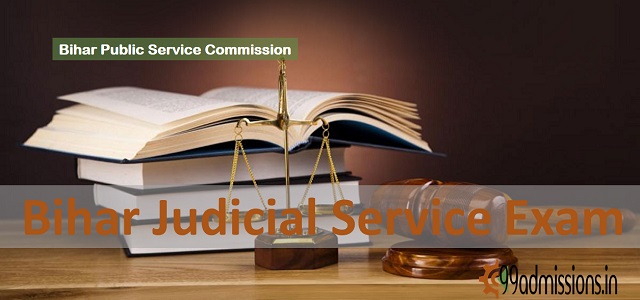Bihar Judicial Service Exam 2023: The notification of the Bihar Judicial Service Exam is released by Bihar Public Service Commission on bpsc.bih.nic.in for the recruitment of various vacancies to the post of Civil Judge. The BPSC conducts this exam every year for the recruitment of civil judges. The recruitment is carried out in three phases – Prelims, Mains and Interview. This will be the 32nd version of the Bihar Judicial Services Competitive exam in 2023. Candidates will be selected and appointed into various vacant posts of Civil Judge. Get more details about Bihar Judicial Service Exam 2023 in the following article.
Bihar Judicial Service Exam 2023: Important Dates
| Start of Online Registration & Application | 1st week of May 2023 |
| Last date of online registration | 3rd week of May 2023 |
| Last Date of paying Application Fees | 2nd week of May 2023 |
| Last Date of Application Process | 3rd week of May 2023 |
| Issue of admit card | June 2023 |
| Prelims Exam Date | July 2023 |
| Mains Exam Date | September 2023 |
Eligibility Criteria
- Candidates must have an LLB or equivalent degree from an institute that is recognized by the Bar Council of India.
- The lower age limit of the candidate should be 22 years and the upper age limit is 35 years.
- The age relaxation is 3 years for the OBC category candidates and 5 years for SC/ST Category.
- The reserved category candidates with the permanent domicile of Bihar will be offered relaxation in the upper age limit.
Upper Age Limit
| Category | Max age |
| SC/ST | 40 years |
| Backward/ Extremely Backward Class | 40 years |
| EWS | 40 years |
| Women | 40 years |
| PwD | 40 years |
Bihar Judicial Service Exam 2023: Application Form
- Visit the official website & click on the application form link.
- Fill all the relevant details and upload scanned passport size photograph and signature in the prescribed format and size.
- The next step is to pay the application fee as given below.
| Category | Fee |
| General | Rs 600/- |
| SC/ST/ Women | Rs 150/- |
| PwD | Rs 150/- |
Exam Pattern
Prelims Exam Pattern
| Paper | Subject | Marks |
| Paper 1 | General Studies | 100 marks |
| Paper 2 | Law | 150 marks |
Mains Exam Pattern
| Subjects | Total Marks |
| General Knowledge including current affairs | 150 |
| Elementary General Science | 100 |
| General Hindi | 100 |
| General English | 100 |
| Law of Evidence and Procedure | 150 |
Optional Subjects
Candidates need to choose 3 subjects out of the following five optional subjects:
- Commercial Law
- Law of Contract and Torts
- Hindu Law and Muhammadan Law
- Constitution and Administrative Law of India
- Law of Transfer of Property and Principle of Equity, Law of Trust and Specific Relief
Interview
- This round will be of 100 marks.
- Candidates who qualify the Mains Exam will be called for the personal interview round.
- Candidates need to score a minimum of 35% marks in the interview to make it to the Merit List.
Syllabus
Prelims Syllabus
- Commercial Law
- Principles of Equity
- Law of Contracts and Torts
- Elementary General Science
- Law of Transfer of Property
- Hindu Law and Muhammadan Law
- Law of Evidence and Procedure
- Law of Trusts and Specific Relief
- General Knowledge including current affairs
- Constitutional and Administrative Law of India
Constitutional and Administrative Law of India
- Ombudsman
- Government Contracts
- Regulatory Authorities
- Public Interest Litigation
- Judicial Review of Administrative Action
- Tortuous Liability of State and Compensation
- Administrative Law of India and Delegated Legislation
- Constitution of India – Article 1 to 395 and Schedules
- Control of Delegated Legislation – Judicial &Legislative
- Tribunals and Quasi-Judicial Authorities; Judicial Control over them
- Promissory Estoppel, Legitimate Expectation & Doctrine of Proportionality
- Writ Jurisdiction and Statutory Judicial Remedies, Scope, Extent & Distinction
- Fair Hearing; Rules of Natural Justice; Rules Against Bias; Audi Alteram Partem
Other Topics
- General English: Unseen passage for summary or précis writing, letter writing, and others.
- Elementary General Science: It tests matters of everyday observation and experience in scientific aspects.
- General knowledge: Indian History, Culture, Geography, Polity, Current events, Currencies & Capitals & static GK.
- Commercial Law: Sale of Goods, Negotiable Instruments, Company Law, and Partnership.
- Law of Evidence and Procedure: Civil Procedure Code (1908), Indian Evidence Act (1872), Code of Criminal Procedure, 1973, Provincial Small Cause Courts Act, Arbitration and Conciliation Act of 1996.
- Law of Contracts and Torts: Defamation, Conspiracy, Remedies, Nuisance, False Imprisonment, Wrongful Dismissal, Indian Contract Act, Malicious Prosecution, General Principles of Liabilities, The Rule in Rylands Yrs. Fletcher Deceit, Injuries to Domestic and Contractual Relations.

